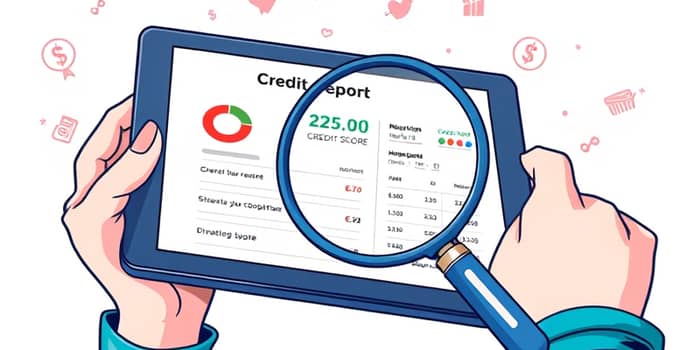
Our credit history governs access to loans, cards, and even apartments. Understanding the subtle difference between inquiries empowers you to navigate reports wisely. Soft pulls offer a gentle peek into your finances without the downside of a hard credit check.
Arming yourself with this knowledge fuels confident financial decision-making process and reduces worries about routine checks. Read on to unlock the power of soft inquiries, learn practical strategies, and maintain control over your credit narrative.
Imagine applying for a new phone plan and worrying whether your credit check will ding your score. Soft pulls exist to remove that fear, making routine checks safe and seamless.
Soft pulls are credit checks initiated by you or by third parties for non-lending purposes. When you check your own credit report, apply for prequalification offers, or go through an employment screening, you experience a soft inquiry.
These checks access only basic account information and score ranges, unlike hard pulls that reveal every detail on your file. Because soft pulls are not tied to credit applications, they pose no risk to your score.
Under the Fair Credit Reporting Act (FCRA), soft pulls do not require your explicit consent for promotional offers, but they remain protected by privacy laws. Employers, however, must obtain written authorization before checking an applicant’s credit, safeguarding personal data and ensuring transparency.
It’s also reassuring to know that inquiries—both hard and soft—remain on your credit report for up to two years. After that period, they drop off automatically, keeping your record focused on your most recent activity.
Whether you’re curious about your current credit standing or exploring better loan deals, soft pulls weave into everyday financial decisions. By separating them from hard pulls, credit bureaus reduce the risk of penalizing harmless activities.
Each of these situations involves a soft pull that remains visible only to you and does not trigger a score change.
For instance, a credit card issuer might run a soft pull to see if you qualify for a balance transfer offer. Should you proceed with the application, a hard pull follows. Knowing this sequence helps you plan applications strategically.
Credit scoring models differentiate between inquiry types to assess genuine borrowing risk. Hard pulls indicate that you are seeking new credit and can lower your score by a few points, typically up to five.
In contrast, soft pulls serve explanatory purposes and are never regarded as risk factors by scoring algorithms. Even multiple soft checks performed within days or weeks have no cumulative penalty on your credit health.
Scoring systems focus on payment history, credit utilization, account age, and recent hard inquiries—none of which are influenced by soft pulls. This clear separation ensures that benign activities cannot inadvertently harm your profile.
Though benign in impact, soft pulls still unveil important personal and financial data to authorized viewers. Consumers should know what details are shared, ensuring they understand the potential sensitivity.
Because soft pulls reveal only a summary level of data, they cannot be used for full lending decisions. They instead provide a quick background snapshot for preapproval processes and internal reviews.
Remember, only you can see soft inquiry details on your full credit report. Third parties lack the visibility to view these entries, preventing misuse of your data. Still, if you’re concerned about privacy, monitoring these entries can alert you to unexpected activity.
If you notice sudden spikes in soft inquiries from unfamiliar companies, it could signal targeted marketing or data sharing you didn’t authorize. In such cases, contacting the consumer reporting agency directly can clarify the source and purpose.
Grasping the distinction between these inquiries empowers you to manage credit activity more effectively. The following table offers a side-by-side view of their key characteristics.
Although soft pulls pose no harm, unsolicited inquiries can feel intrusive. You can take steps to reduce unwanted screenings and preserve privacy.
Another powerful tool is the credit freeze. By freezing your credit, you block both soft and hard inquiries, granting you absolute control. While this may restrict legitimate prequalification checks, you can lift the freeze temporarily when needed.
Maintaining close oversight over all inquiries—hard or soft—strengthens your awareness and keeps you informed about who is viewing your credit file.
Understanding credit inquiries equips you with clarity and confidence. By differentiating soft pulls from hard pulls, you can navigate applications and routine checks without fear of score damage.
Make proactive credit monitoring a regular habit, and use this insight to negotiate better rates, secure favorable terms, and seize new opportunities in your financial life.
Beyond understanding pulls, commit to healthy habits like paying bills on time, keeping credit utilization below 30%, and avoiding unnecessary new accounts. Over time, these behaviors carry more weight than any single inquiry.
Regularly access free annual reports from each of the three major bureaus—Experian, TransUnion, and Equifax—to compare entries and ensure accuracy. Dispute errors promptly, as fixing mistakes can boost your score more than waiting for the next prequalification offer.
Every credit inquiry tells a story. When that story is guided by informed choices, you build a credit history that truly reflects your responsibility and ambition. Embrace the nuances of soft pulls, and step forward with comprehensive credit health management.
References













